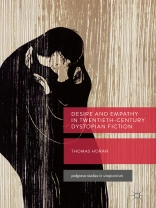This book assesses key works of twentieth-century dystopian fiction, including Katharine Burdekin’s
Swastika Night, George Orwell’s
Nineteen Eighty-Four, and Margaret Atwood’s
The Handmaid’s Tale, to demonstrate that the major authors of this genre locate empathy and morality in eroticism. Taken together, these books delineate a subset of politically conscious speculative literature, which can be understood collectively as projected political fiction. While Thomas Horan addresses problematic aspects of this subgenre, particularly sexist and racist stereotypes, he also highlights how some of these texts locate social responsibility in queer and other non-heteronormative sexual relationships. In these novels, even when the illicit relationship itself is truncated, sexual desire fosters hope and community.
Tabella dei contenuti
1. Introduction.- 2. The Sexualized Proletariat in Jack London’s
The Iron Heel.- 3. Redemptive Atavism in Yevgeny Zamyatin’s We.- 4. The Sexual Life of the Savage in Aldous Huxley’s
Brave New World.- 5. Katherine Burdekin’s
Swastika Night, a Gay Romance.- 6. Distortions of Queer Desire in Ayn Rand’s Anthem.- 7. Desire and Empathy in George Orwell’s
Nineteen Eighty-Four.- 8. Ludic Perversions and Enduring Communities in Margaret Atwood’s The Handmaid’s Tale.- 9. Conclusion.
Circa l’autore
Thomas Horan is Associate Professor of English at The Citadel, Charleston, USA. He has previously published articles in a number of journals. He edited
Critical Insights: Nineteen Eighty-Four (2016) and is currently editing
Critical Insights: Animal Farm.












